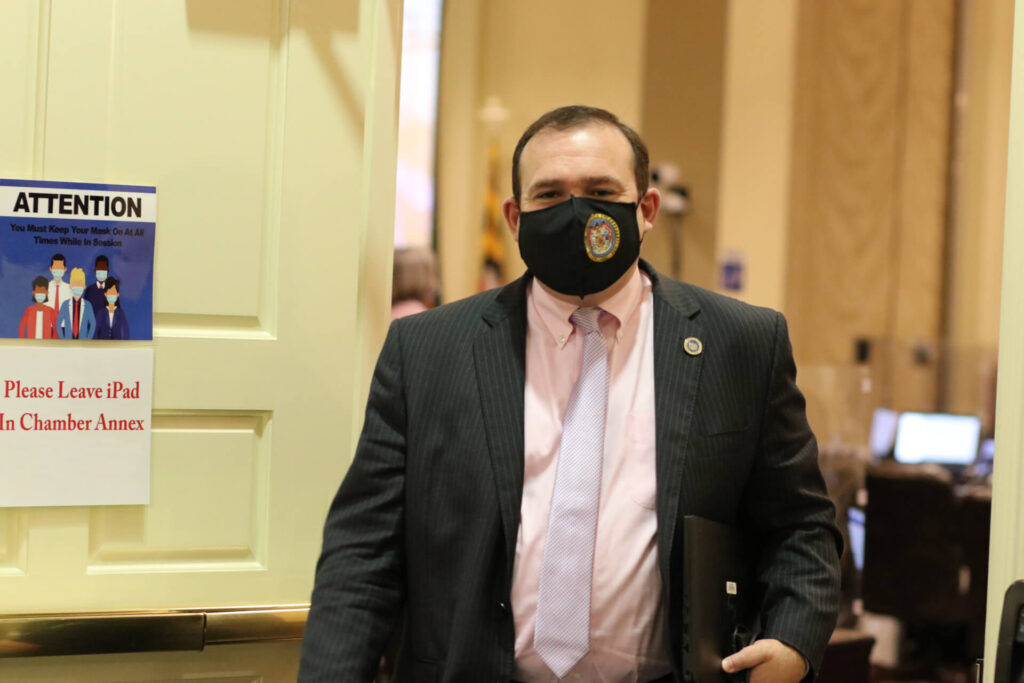This article was republished with permission from WTOP’s news partners at Maryland Matters. Sign up for Maryland Matters’ free email subscription today.
This content was republished with permission from WTOP’s news partners at Maryland Matters. Sign up for Maryland Matters’ free email subscription today.
The Maryland Department of Health has a backlog of unpaid invoices owed to contracted health care providers and grant recipients dating back six months.
According to Del. Kirill Reznik (D-Montgomery), the agency has accumulated over 900 outstanding invoices from as far back as July 2021. The vendors have provided services to the state including mental health counseling and assistance in connecting people to treatment for opioid abuse.
“So the cyberattack — the ransomware attack — though it may have slowed things down in December, does not answer why folks haven’t been getting paid since July,” Reznik told Maryland Health Secretary Dennis R. Schrader during a meeting of the House Appropriations Committee’s Health and Social Services Subcommittee on Monday afternoon.
Reznik’s revelation comes as the agency continues to battle staffing shortages and myriad problems at the Office of the Chief Medical Examiner.

Amalie Brandenburg, the chief financial officer for the Department of Health, said that the reason for the delay in payments was the result of a “perfect storm.”
According to Brandenburg, vacancies in the agency’s general accounting department, the significant amount of money that has been spent battling COVID-19 and the “network security incident” that crippled the Department of Health’s network in early December have all played a role in the backlog.
“Yes, there has been an issue. I’m happy to report that we are well on the other side,” Brandenburg told Reznik.
She said that the Department of Health has been processing a higher volume of invoices and expects to have “the backlog completed by the end of the month.”
Reznik said that some providers have had to take out loans to be able to pay their employees “because they are not getting paid by the department on legitimately approved invoices.”
Reznik, a federal contractor, pointed to the federal Prompt Pay Act, which states that the government must pay an interest penalty to its contracted service providers if their invoices aren’t settled within 30-days.
“Is there any recompense for the providers that are literally taking out loans to be able to keep their people employed while you all are dealing with the backlog?” Reznik asked Brandenburg.
Brandenburg said that the department has not considered that “at this point,” but told Reznik she was willing to discuss the possibility in a separate conversation.
Reznik has put an emphasis on accountability within the Department of Health this session.
Monday evening, the House Health and Government Operations Committee’s Public Health and Minority Health Disparities Subcommittee voted on a measure Reznik is sponsoring to require the state to maintain adequate staffing levels at the Office of the Chief Medical Examiner.
Under the bill, the office would be mandated to have enough employees to avoid violating standards of the National Association of Medical Examiners, the office’s accrediting body.
A “phase two” violation from the association — infractions related to unmet staffing, investigation or morgue operation standards — can lead to the demotion or revocation of an agency’s accreditation status.
The Office of the Chief Medical Examiner has such a substantial autopsy backlog that former Chief Medical Examiner Dr. Victor Weedn, who resigned Friday, requested help from the Federal Emergency Management Agency’s Disaster Mortuary Operations Response Team.
Those teams typically respond to assist state and local governments after natural disasters, terrorist attacks, transportation accidents and other emergencies.
Reznik said Monday that the crisis the agency is facing is one of its own making, noting its heavy reliance on per diem workers to complete autopsies in the past few years.
Per diem forensic pathologists earn $850 for each case they take on. They often are retired or flown in from other states.
Reznik said that several of Maryland’s full-time forensic pathologists nearing retirement have left the agency early, only to come back as per diem workers.
“Last year, five of them retired and all came back as per diem,” he told the subcommittee. “So they’re collecting their retirement and they’re collecting $850 and they’re getting easier cases because the premiums get the easier cases to clear.”
According to Reznik, this is demoralizing for the office’s full-time staff who are being assigned harder cases for less pay.
“This office has created the problem,” he continued. “It’s not a money issue, but the fact that they have raised salaries significantly only this year when the crisis hits and the fact that they have reopened these 21 pins only this year when the crisis hit … demonstrates a lack of forethought that has to be fixed and held accountable.”
The bill passed out of the subcommittee on a unanimous vote.







